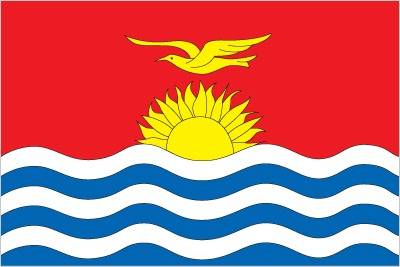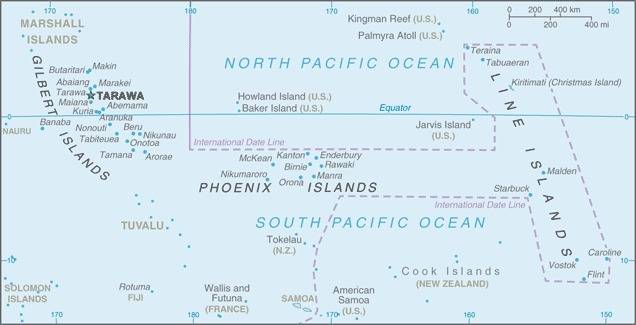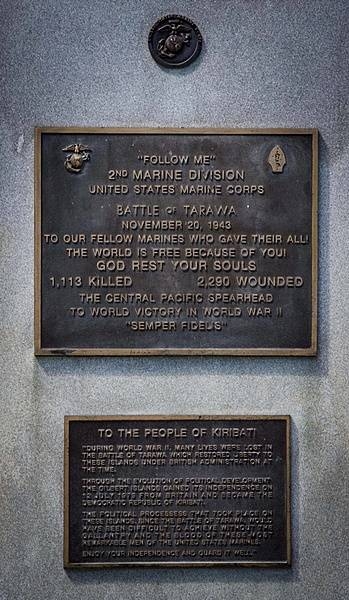39 Kiribati

The upper half is red with a yellow frigatebird flying over a yellow rising sun, and the lower half is blue with three horizontal wavy white stripes to represent the Pacific ocean. The white stripes represent the three island groups – the Gilbert, Line, and Phoenix Islands. The 17 rays of the sun represent the 16 Gilbert Islands and Banaba (formerly Ocean Island). The frigatebird symbolizes authority and freedom.
Flag courtesy of the CIA World Factbook

Map courtesy of the CIA World Factbook

A close up of the plaque on the US Marine Corps Memorial commemorating the Battle of Tarawa that took place on Betio Island, Tarawa Atoll, and Kiribati on 20 November 1943. More than 1,100 Marines died and over 2,200 were wounded during the Battle of Tarawa.
Photo courtesy of the CIA World Factbook
Government
According to Britannica, Kiribati has a president elected by the populace from among three or four candidates chosen by and from members of the national legislature, the unicameral House of Assembly (Maneaba ni Maungatabu). The president can serve up to three terms of four years each, but terms may be cut short by a vote of the legislature. The House of Assembly has 42 members, 40 elected; 1 appointed from the expatriate Banaban community on Rabi Island in Fiji; and the attorney general, who serves as an ex officio member—who serve four-year terms. The president chooses up to 10 cabinet ministers from the legislature, and they remain responsible to it. Local government is through elected island councils.
Civil Aviation Authority of Kiribati (CAAK)
The Civil Aviation Authority of Kiribati (CAAK) was first established as a corporate body in 2015 under the Civil Aviation Act that aims to achieve a cohesive, safe, responsive, and sustainable regulatory system for air transportation in Kiribati, its focus is to establish a safe and secure skies for I-Kiribati and tourists. In an evolving aviation industry, the CAAK is facing challenges as it continues to respond to an increased need for the regulatory and security services to keep people safe and secure.
Pacific Aviation Safety Office (PASO)
The Pacific Aviation Safety Office (PASO) is an international organization providing quality aviation safety and security service for Member States in the Pacific.
PASO is the sole international organization responsible for regional regulatory aviation safety oversight service for the 10 Pacific States who are signatories to the Pacific Islands Civil Aviation Safety and Security Treaty (PICASST).
The current PICASST signatories are the Pacific nations of Cook Islands, Kiribati, Nauru, Niue, Papua New Guinea, Samoa, Solomon Islands, Tonga, Tuvalu, and Vanuatu. Associate Members of PASO are Australia, Fiji and New Zealand. Government representatives from these nations make up the PASO Council.
Airspace
SkyVector – Google Maps – ADS-B Exchange
ICAO countries publish an Aeronautical Information Publication (AIP). This document is divided into three parts: General (GEN), En Route (ENR) and Aerodromes (AD). ENR 1.4 details the types of airspace classes they chose to adopt from classes A through G.
Drone Regulations
Part 102 Unmanned Aircraft Operator Certification
Advanced Air Mobility (AAM) Regulations & Policies
Advanced Air Mobility (AAM) News
None found by the author.
However, should you, the reader, happen to stumble across something to the contrary, please email the author at FISHE5CA@erau.edu and you may be mentioned in the ACKNOWLEDGEMENTS section of this book by way of thanks for contributing to this free eBook!
Short Essay Questions
Scenario-Based Question
You have been hired by a Drone Startup Company. Your boss has immediately assigned this job to you.
They need you to prepare a one-page memo detailing the legalities of using a drone at Tarawa Atoll, pictured above.
They need you to mention any national laws and local ordinances.
They specifically want to know what airspace (insert pictures) you will be operating in and whether or not you need an airspace authorization.
Does it matter whether or not you are a citizen of the country?
Lastly, there is a bonus for you if, as you scroll through this chapter, you find any typos or broken links!
Short Essay Questions
- What are the drone categories?
- How is registration addressed?
- How is remote ID addressed?
- What are the model aircraft rules?
- What are the commercial drone rules?
- Are there waivers or exemptions to the rules? If so, for what?
- Would you share a link to an interactive airspace map?
- How is BVLOS addressed?
- How can you fly drones at night?
- How can you fly drones over people?
- Where do you find drone NOTAMs?
- What are the rules for drone maintenance?
- What are the rules for an SMS program?
- What are some unique rules not mentioned above?
- What are the C-UAS rules?
- What are the AAM rules?

